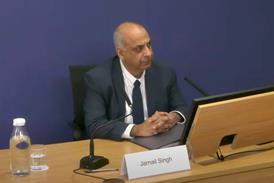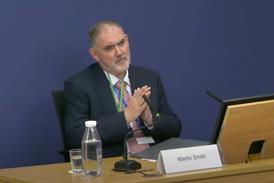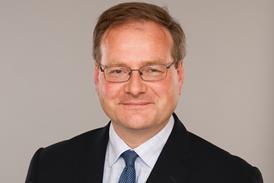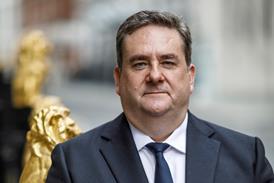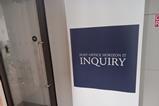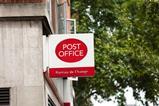Follow our live blog from the public inquiry into the Post Office Horizon scandal
4.20pm: Stevens is done and says four other lawyers want the chance to question Aujard. Sir Wyn Williams, the chair, is not keen, and suggests Aujard comes back another day.
Aujard says that he would really prefer to get things finished this evening, but Williams is not budging. Aujard will indeed return at a later date. The hearing wraps up, as does this blog. Angela Van Den Bogerd, a key member of the executive team, will be in the witness chair tomorrow – no doubt with the national media taking a very keen interest in what she has to say.
4.15pm: The inquiry sees a note from chief executive Vennells in 2014 to Aujard, in which she raised the ‘serious’ issue that the potential cost of the mediation scheme is already over £10m. She said that when the Post Office entered into the scheme, the intention was not for it to result in major compensation for sub-postmasters. Vennells added: ‘We seem to have lost this focus and I am looking for advice on how we regain it.’
Aujard says the idea was to offer small sums of money to any victims that could be identified through the mediation, amounting to no more than three months’ salary each.
3.55pm: Aujard is asked for his assessment of why the Post Office terminated the role of Second Sight after its interim report but before a final one. He denies this was done because Second Sight was investigating points of dispute between Post Office and the sub-postmasters.
Aujard says there were ‘numerous issues’ in the relationship and there was a ‘strong sense that Second Sight was not providing value for money’. He suggests there was also a perceived problem with balance and that Second Sight had taken on a ‘campaigning manner’ and commenting on matters that were outside its field of expertise and not supported by evidence.
3.40pm: The inquiry looks at the potential sacking of Second Sight from its role in the mediation scheme.
A Post Office analysis states that the recommended option is the ‘quick and simple’ decision to disband the ongoing mediation scheme and terminate Second Sight’s role. Among the pros of this decision is that it will limit operating costs and financial liabilities in the short term. The ‘cons’ listed include that it will led to conflict with sub-postmasters and could lead to accusations of a whitewash.
The option of altering the mediation scheme had the advantage of fairness and transparency.
Inquiry counsel Sam Stevens asks whether this decision shows that the Post Office lacked fairness and transparency. Aujard concedes it does.
3.15pm: After a break, the inquiry looks at the briefing note written by Aujard which was intended to summarise the Deloitte report for the board.
This note states that Deloitte had not become aware of anything that would question the integrity of Horizon data and that the system ‘would operate to protect transaction data integrity from when it enters the system in a branch until stored in the audit store, and provide visibility to subpostmasters of any centrally generated (ie non-branch) transactions.
Aujard now accepts this note was ‘far too abridged’ given what Deloitte had found about remote access.
He tells the inquiry: ‘There was enormous pressure to get something out very quickly and in those circumstances… the note did not bring out fully those concerns.
‘I was under intense pressure from Paula [Vennells] in particular to get something to the board. If it is an oversight then with hindsight I regret that this was not as a briefing as it should have been.’
2.50pm: A series of notable findings from a 2014 report from Deloitte into the reliability of Horizon data. This is critical in terms of whether prosecutions based on Horizon were reliable and what the Post Office knew.
Deloitte’s report – made available to the Post Office board – states that ‘it is not clear from the documentation we have been provided whether POL has agreed that the current capturing of certain, key system events, is complete and appropriate for potential governance and investigation needs'. In other words, the data may not support prosecutions.
Then what journalist Nick Wallis calls a 'bombshell'. Deloitte found that privileged users at Deloitte were able to delete a legitimate sealed filed and replace it with a ‘fake file’ in an undetectable manner. This goes to the heart of the remote access point.
The section below was presented to the Post Office board in June 2014.
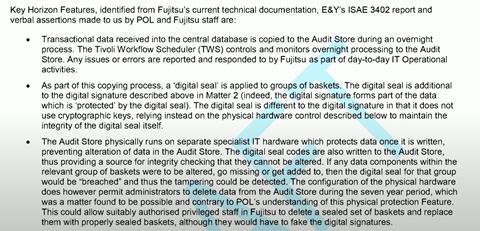
2.35pm: Board minutes from April 2014 record that Aujard explained to members that several sub-postmasters were challenging Horizon through allegations about ‘phantom transactions’ which were non-traceable. This again goes to the issue of remote access to alter branch accounts and to what extent Post Office knew this was possible. Aujurd agrees that remote access was ‘firmly’ in the minds of him and the board by this point.
2.10pm: The inquiry sees correspondence from magic circle firm Linklaters, which was instructed to advise in 2013 on the mediation scheme for sub-postmasters.
The subsequent report observes there had no objective investigation into the role and use of Horizon. However, it seems to be ‘accepted generally’ that there are no systemic weaknesses in the Horizon system. This has been made plain by the expert evidence in the case against Bridlington sub-postmaster Lee Castleton and the provision of expert reports by Gareth Jenkins of Fujitsu.
The report states that Jenkins was only required to give oral evidence in one case (the successful prosecution of Seema Misra in 2010), adding: ‘In all other cases the fact that [Jenkins] was not required to give oral evidence strongly suggests to us that there was no substantive challenge to his evidence.’
Aujard admits this analysis should have been contextualised with the Clarke Advice, which raised serious questions about the reliability of Jenkins’ evidence.
1.55pm: Back after the lunch break, and the inquiry looks in more detail at Aujard’s decision to stop Post Office prosecutions.
His written statement says that in November 2013 the organisation was concerned that a change in policy might affect the progress of mediations by raising questions on previous prosecutions. His notes there was ‘obvious reluctance’ at board level to cease prosecutions as the Post Office viewed them as a deterrent. Chief executive Paula Vennells in particular was said to be keen the Post Office could still bring prosecutions but would be ‘more circumspect in the cases it chose to take’.
12.40pm: The inquiry sees Aujard’s first board paper presented to the Post Office board, three weeks after he joined (see below). He says that the ‘headline conclusion’ of the ongoing review is that there has been ‘no systemic or fundamental flaws in the review process’.
Aujard later made the decision to halt criminal prosecutions and recommended to the board that executive policy be changed.
‘I felt that the criminal prosecutions caused great distress and anxiety and didn’t have a place in a business such as the Post Office,’ he says.
The inquiry now breaks for an hour-long lunch.
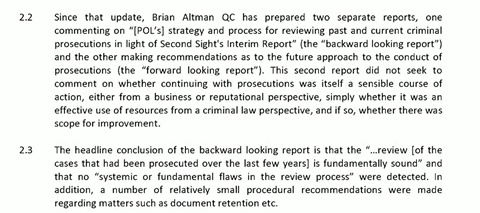
12.15pm: Stevens pressing Aujard on his response to a briefing given by Cartwright King when he joined about expert witness Gareth Jenkins. The briefing suggested that Jenkins was an unreliable witness but Aujard says he understood this to be a ‘historic issue recently discovered’ that did not need to be disclosed.
Asked why he did not look at the briefing in more detail, he says: ‘I believe that at the time I received this briefing I was given assurance these issues were now being addressed… when I first joined the Post Office with no knowledge of criminal law there were no flags raised to me to say there were ongoing matters that needed to be addressed.’
Asked if he accepts now that this matter ‘fell squarely’ within his responsibility as a general counsel, Aujard agrees but adds: ‘I don’t think I would have been able to come a view on the extent of the disclosure obligations beyond that which was presented to me by Cartwright King.’
11.55am: Aujard is taken by counsel Sam Stevens to his witness statement (which can be found here) where he says external firm Bond Dickinson was ‘so embedded within POL that in many ways they acted as an extension of the in-house legal team, frequently attending internal POL meetings on the matters with which the inquiry is concerned’.
He tells the inquiry that Bond Dickinson’s Andy Parson, who will appear as a witness next month, did not just give legal advice on the mediation scheme and Post Office liability, but also strategic advice on how the organisation should approach matters.
Aujard then asked about criminal lawyer Jarnail Singh, who gave evidence last year and returns next week. The former GC said he was satisfied about Singh’s technical competence but he was ‘not someone I would go to for higher order matters to do with complex criminal issues’. After 2013, Aujurd says, Singh was ‘rather under-occupied’ without many criminal cases to handle.
11.35am: Chris Aujard is now giving evidence. He begins by correcting a section of his statement where he said he did not authorise any prosecutions. He now states that he did authorise two prosecutions, but they were not Horizon-related.
He then makes a statement: 'I want to start by saying how deeply sorry I am to the sub-postmasters and mistresses and Post Office employees for the anguish and suffering that you and your families have had to endure. I know for many people this has come far too late but I hope the evidence I can give today will help get to the heart of what has happened and in so doing will stop anything like this from ever happening again.'

11.15am: Blake finishes his questions and hands over to core participants. The lawyer representing expert witness Gareth Jenkins asks a couple of technical questions before Sam Stein KC, representing some sub-postmasters, is given the floor.
He asks if the Second Sight report was a turning point in the Post Office scandal - even if the forensic accountants were sacked by Post Office before their final report. Crichton agrees with that analysis.
She is asked whether she put her professional duties at the forefront of her work. She says that she tried to.
'I was put in a position where I couldn't do my job,' she says about her resignation in 2013. 'I couldn't deliver on it.'
Stein finally asks if she signed an NDA when she made a settlement agreement with the Post Office to resign, and whether she has since been released from it.
'I hope so,' she says. Crichton is now done and the inquiry goes to a break.
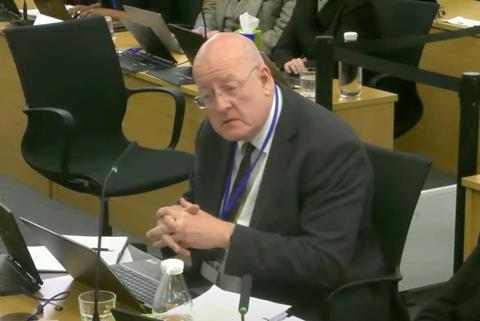
10.50am: Crichton is asked now about the Post Office's relationship with external lawyers. Crichton says she was concerned that external lawyers were ‘not taking their obligations seriously'.
Cartwright King, a firm whose name has come up repeatedly during the inquiry, was effectively outsourced prosecutions on behalf of the Post Office. Martin Smith, a solicitor from the firm, emailed in 2013 about the publication of the Second Sight report and stated that in some prosecution appeals this would not be disclosable.
Crichton accepts she did not do enough to make sure external lawyers were compliant. The inquiry is taken to an email from July 2013 from Crichton to another external firm, Bond Dickinson. In this email, Crichton explained that she had asked Cartwright King to review a letter about a letter from the Criminal Cases Review Commission.
Her email continued: ‘[Cartwright King’s] advice feels off to me as if given on a take or leave it basis and I am not comfortable that’s particularly useful…. I am happy to go to another firm that specialises in criminal law or a barrister, somehow it feels as if there is a conflict here which I am not sure I understand.’
10.30am: Slightly more scattergun approach this morning. Blake moves onto remote access and the transcript of a meeting Crichton had with Second Sight and the Post Office company secretary in which it was raised that Horizon operator Fujitsu could access branch accounts without sub-postmasters knowing about it. An email is shown to the inquiry that shows Crichton was told in Jun 2013 that remote access may be possible. She states that she obviously received the email but her attention was not drawn to it.
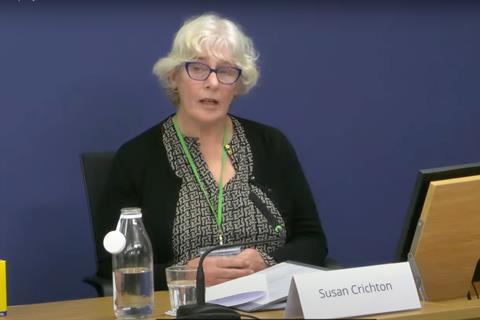
10.15am: Crichton is taken to the issue of her not being routinely invited into boardroom meetings. She says this was a very different approach to in-house lawyers compared to US companies that she had worked with before.
Crichton is asked whether she flagged up with the board when she received advice that expert witness Gareth Jenkins' evidence may have been flawed, and when she received advice that there may have been shredding of key documents to prevent them being disclosed.
Chair Sir Wyn Williams presses Crichton not on whether she could have flagged up these issues to the board but whether she should have. She concedes that she should have set up a process to ensure the board was told.
10am: Blake begins by asking specifically about in-house criminal lawyers Rob Wilson and Jarnail Singh. Crichton declines to speak about their competence but says there was an issue with 'attitude', and in particular their 'unhealthy view' of sub-postmasters. Crichton says their approach was that this was public money and they had to protect it.
She adds that Singh and Wilson told her that there had been no prosecutions based on Horizon evidence which had failed. This turned out not to be true. Crichton said she trusted their word because they were lawyers and 'must have known what they were talking about'.
9.50am: So what did we learn from yesterday's appearance from Crichton?
She appears to have been trapped between evidence emerging that Horizon convictions were unreliable and her role in the Post Office, where she was expected to promote the interests of the business.
She was shut out of a board meeting where she was due to present a paper on the Second Sight review of Horizon. The Post Office chair found it 'astonishing' that Crichton wanted to keep her distance from the Second Sight team and chief executive Paula Vennells complained that Crichton prioritised her integrity as a lawyer.
But there was also evidence that Crichton sought to place limits on the scope of the Second Sight review and little sign of her responding when it seemed that figures in the Post Office advised that key documents be shredded.
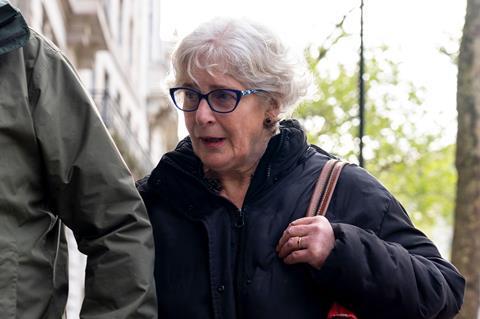
But first, some unfinished business from yesterday. Inquiry counsel Julian Blake had not finished questioning Aujard's predecessor Susan Crichton so she returns this morning.

